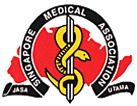
THESMANEWS
Present Issue
Past Issues
Journals
Present Issue
Past Issues
Letters to the Editor


This site is supported by Health ONE
QUALITY OF CARE
"Guidelines are not perfect in themselves but will serve as a very valuable tool to
help manage patients’ illnesses and serve as a benchmark for quality
measurement." - Dr Chen Ai Ju
(Second part of the opening
address of Dr Chen Ai Ju, Director of Medical Services, at the 9th SGH Annual Scientific
Meeting. The first part on medical training was published in the May 98 issue of the SMA
News)
First, we must increasingly be concerned with how to improve the quality of patient care we deliver. You might ask what is actually meant by "quality care". Quality, in its broadest sense, has been frequently defined as "doing the right things, at the right time, for the right people, and doing them right _ the first time". In the context of medicine, let me quote the definition of high quality medicine as that given by one Dr Arnold Relman: "High quality care is the care given to a particular patient under particular circumstances by a compassionate and competent physician who has access to consultations and the best current information, who is not influenced by economic incentive, and who is committed to serve the patient’s best interests guarded by, the latter’s wishes and medical needs". Thus quality must be measured by the patient’s experience of the care you provide, as well as the clinical result.
We must continually ask whether the drugs we prescribe, the procedures, and the technology we use, are appropriate and effective, for the patient. And finally, our patients must be satisfied with the treatment and the services we provide. With all these in mind, we must be sure that we have tried our best, that mistakes are minimised and good clinical results have been achieved, each time our patients consult us. In short, our patients must be confident that they can rely on us to provide high quality care.
Our patients today are more educated and affluent, spurred on by improved communication technology world-wide providing information on the latest medical advances. They are demanding more from the health care professionals. On the other hand, we are faced with increasing constraints on our resources, as healthcare costs escalate. A certain level of rationing must always be practised and will always remain an integral part of the clinical decision-making process. In such an environment, quality will have to be at the top of our checklist if we want to maintain the trust patients put in us, and to fulfil our aim to achieve medical excellence and develop Singapore into a regional medical hub.
There are now various tools available which can help to improve the quality of patient care, such as evidence-based medicine, clinical practice guidelines, health technology assessments, etc. You must consciously use these means to improve the way you practise, deliver the services, and organise medical care.
Increasingly, health care professionals will have to change their mindset of practising medicine based on personal impression or opinions, to that which is based on scientific evidence. While the principles of medicine must be based on science, there is "art" in application. You need to collaborate with the nurses and the therapists etc., to come up with a plan of care that reflects the best clinical practice and which satisfies the needs of the patients.
The Ministry is spearheading the formation of national expert groups to produce clinical practice guidelines, which outline clinical interventions, their optimal timing, and the outcomes expected through such interventions. These groups will also produce guidelines for high volume, highly complicated and high-cost medical conditions, and procedures. The National Specialty Centres for Ophthalmology, Dermatology, Psychiatry, Paediatrics, Obstetrics & Gynaecology, Cancer and Cardiac Care have been tasked to do this for the conditions under their purview. In addition, guidelines will also be produced for other important diseases such as diabetes, prostatomegaly and the various common infectious diseases, etc. Guidelines are not perfect in themselves but will serve as a very valuable tool to help manage patients’ illnesses and serve as a benchmark for quality measurement.
Clinical guidelines and protocols will be drawn up after wide consultations with the relevant clinicians and references to medical literature. Many of the senior clinicians in SGH are involved in these expert groups. I urge you to give it your utmost commitment not only in helping to prepare the guidelines, but also in their implementation. It has been shown conclusively that the most effectively drawn compliance with the clinical practice guidelines and evidence-based medicine are those that are driven by practising clinicians themselves.
Another important consideration for the clinicians is the issue of ethical practice of Medicine. From time to time, the National Medical Ethics Committee distributes to hospitals ethical guidelines for clinical care and research under different clinical settings. These will serve to provide guidance to the doctors in making clinical decisions.
To ensure quality medical care in Singapore, our regulatory mechanism will be strengthened. In this respect, the Ministry is reviewing a number of laws. Amendments have already been made in the Medical Registration Act which has come into operation earlier in the month of April to allow, amongst other goals, the setting up of a framework for training and accreditation of specialists, and to give more power to discipline errant doctors.
Amendments have also been made in the Medicine (Clinical Trials) Regulations to ensure that Good Clinical Practice Guidelines are complied with in the conduct of clinical trials. Changes are being planned in the Private Hospitals and Medical Clinics Act to allow for proper auditing of clinical practice and overseeing quality clinical care. Another area of legislation which has a bearing on the quality of clinical practice is nursing care. In respect, the Nurses and Midwives Act is being reviewed to give the Nursing Board greater powers to manage the standard of nursing care.
K